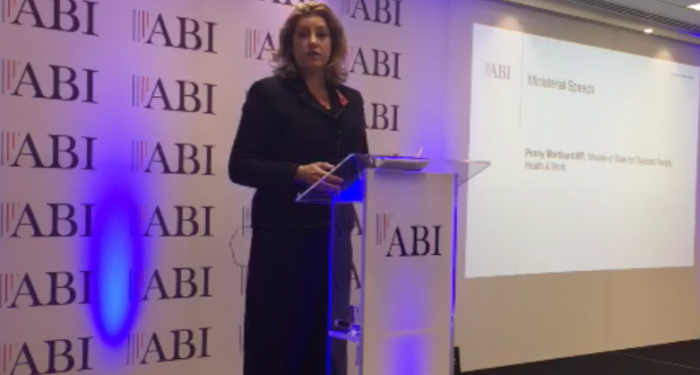The group risk sector offers valuable benefits to employers and employees but should do more product development to ensure the true value of group income protection is understood by them, minister for the disabled, health and work Penny Mordaunt MP says.
Click hyperlink in text to see videoSpeaking at the ABI’s Mental Health Conference last week, Mordaunt said there would not be a white paper response to the Improving Lives green paper, but that a ‘road map’ of positive actions to be taken by the Government would be published soon. She supported the ABI’s proposal for a protection statement that would help individuals understand how much, or little, they would have to live off in the event they became long term sick. Income Protection Task Force spokesman Roy Mcloughlin says his organisation floated the idea of a protection statement around a decade ago.
She praised the positive aspects of GIP but said the group risk industry should do more product development to better communicate and present the benefits of the product to employers. Group risk professionals have challenged this view, arguing current products are already fit for purpose.
Mordaunt said: “We are looking at long term solutions and will be publishing our road map, an actual plan of actions, imminently. During the consultation we consulted on group income protection as a way to increase employer access to expert-led, occupational health, rehabilitation and prevention services. We recognise the positive aspects of GIP for helping retain sick employees, in particular access to expert-led occupational health. We want employers to invest in the wellbeing of their employees, in the preventative and rehabilitation elements of GIP, including clinical and professional expertise, HR, line management training and workshops, face-to-face support and online support. That can help employees stay healthy and stay in work, or support them to return to work.
“Through the green paper consultation we have developed a clearer understanding of the current barriers that prevent increasing take-up of GIP by employers, particularly smaller employers. They include a lack of awareness, both of the product in general and of the wider employee benefits that GIP provides, and the financial barriers. These barriers are recognised by the insurance industry. But there may be more that the insurance industry could do to consider the cost and complexity and the communication, critically, of GIP and also of individual income protection.
“The Government would like the industry to develop products that retain the positive aspects of GIP, but which overcome those existing challenges and is therefore more likely to be taken up. We very much support the ABI, working alongside the Learning and Work Institute and Policy in Practice to develop a prototype protection statement, which is designed to help people make an informed choice about whether to put their own protection in place. And it will take the form of a tool or calculator that will input information from both the individual and the employer to calculate what someone’s income would be at different times in health-related absences.”
Group Risk Development spokesperson Katharine Moxham says: “It was positive to hear both the minister and Lord Stevenson, author of the review into workplace mental health, co-authored with Paul Farmer, sing the praises of group income protection. It is disappointing that there won’t be a white paper response but will be a ‘road map’ setting the direction of Government policy in workplace mental health. But it is good to see the Government so engaged with the virtues of what the sector has to offer.”
Canada Life Group Insurance marketing director Paul Avis says: “For the second time in a matter of days the group risk industry has been asked to take action on group income protection.
“The speech by Penny Mordaunt MP suggested we in the group risk sector need to do more product development. But I believe group income protection is fit for purpose, affordable and provides clear business benefits such as return on investment, return to work support for employees, reduces occupational and statutory sick pay, ensures employers comply with the Equality Act 2010 with absence durations where insurers are allowed to engage early averaging five to seven weeks.
“I do not think we need to do more on product development or affordability, We just need to get these positive messages out to employers, and as a 100 per cent intermediated insurer we would welcome proactive discussions with any adviser that wants to seize the opportunity of this high profile discourse.”





